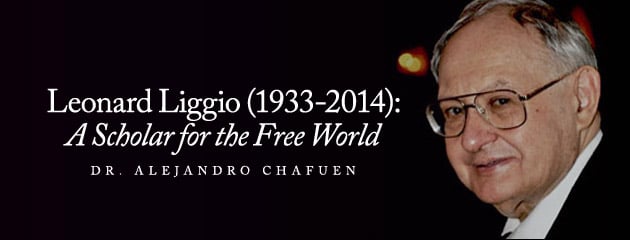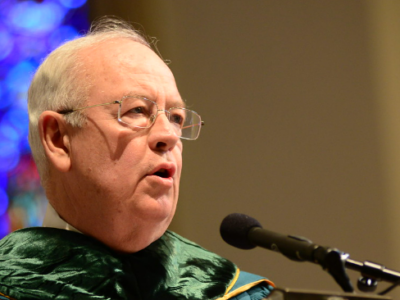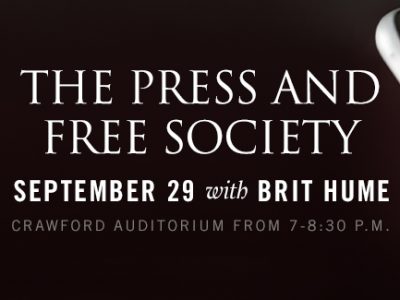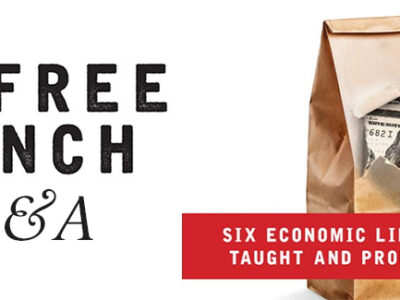
Editor’s note: This article first appeared at Forbes.com.
The free society lost a great champion on October 14, 2014 when Leonard P. Liggio passed away.
I first met Leonard Liggio in 1980 at a Mont Pelerin Society (MPS) meeting held at the Hoover Institution. He was standing on the left side of the packed auditorium next to Murray Rothbard. At the time, Liggio was president of the Institute for Humane Studies (I.H.S.). At the time of his passing, he was vice president of the Atlas Network. John Blundell (who recently passed away), succeeded Liggio as president of I.H.S. and also became president of Atlas Network (1988-1991). Blundell and Liggio had an outstanding relationship.
In Virginia, I worked daily with Leonard on different projects at Atlas. With his deep and encyclopedic historical knowledge, he complemented and enlightened Atlas Network’s work to create and nurture public policy think tanks. His understanding of the evolution of legal institutions helped me and many others put our economic and policy arguments into a better perspective.
In 1990, Manuel Ayau (1925-2010), the founder and late president of the Universidad Francisco Marroquín in Guatemala, asked Leonard and I to help him build the program of a regional MPS meeting. Although the topic always led to major disagreements among classical liberals, we organized a panel on religion and liberty. We invited Father Robert Sirico to speak. That meeting led to conversations among us and eventually to the founding of the Acton Institute for the Study of Religion and Liberty. The co-founders, Sirico and Kris Mauren, asked us to become founding trustees. Our next joint effort was in 1993 with Tony Sullivan, then at the Earhart Foundation, developing a program to promote classical liberal ideas among the Muslim world. We provided advice and some support to The Minaret of Freedom Institute founded later that year.
After a restructuring of I.H.S. in 1988, Atlas had a chance to bring Liggio onto its team. I.H.S. focused on scholars, and Atlas on think tanks, but the latter needed the input and academic guidance of figures like Leonard. Plus, a new crop of intellectual entrepreneurs working at universities would profit from having such a talented and generous scholar helping them multiply their impact. Seeing its enhanced academic capital, the John Templeton Foundation asked Atlas to administer the Templeton Freedom Project, which focused on teaching the principles of the free society at universities in the United States and across the globe. Those investments continue to bear fruit.
Describing Liggio’s affiliations and saying a few words about their relevance would fill an academic paper. Think tanks and academic societies in Austria, Italy, Liechtenstein, France, Turkey, and the United Kingdom benefitted from his advice and knowledge. He had a stellar career in the United States. In addition to I.H.S., he was president of the MPS, the Philadelphia Society, vice president of the Cato Institute and the Atlas Network, and a trustee of the Competitive Enterprise Institute. Also, Leonard and I were involved in the early discussions of the Christian, conservative think tank at Grove City College: The Center for Vision & Values. As a member of the board of Liberty Fund, his knowledge of the international academic scene helped the Liberty Fund invest wisely across the globe helping connect the best liberty scholars in the world.
Leonard won several awards and recognitions, including an honorary doctorate from the Universidad Francisco Marroquín and the 2007 Adam Smith Award, conveyed by the Association for Private Enterprise and Education. Numerous academic journals have profited from his editorial advice, and hundreds (if not thousands) of young academics benefitted from his insights and generous recommendation letters. He helped many with their book projects. Perhaps due to that generosity, he never completed a book of his own, but his dozens of learned academic papers and lectures will illuminate generations to come.
Liggio was much more than a man of ideas, he was also a man of the spirit. Whenever he saw a friend or colleague with some pain in their soul, he shared with them, with respect, love, and above all, understanding, the treasure that he found in his Catholic faith. He always reminded think tank leaders to avoid scheduling events during the religious holidays of other faiths. Leonard Liggio was a scholar, intellectual entrepreneur, and generous human being who serves as an example of how to devote a life to promote the free society.




